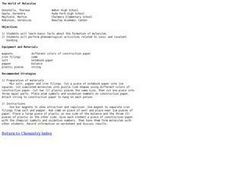Curated OER
WS 10.12 Review
In this organic molecules worksheet, students draw molecules given their names, they draw line isomers for a given compound, they predict products of reactions, they write equations for hydration reactions and they write chemical equations.
Curated OER
What Influences Reaction Rate?
Students study reaction rates, what determines how fast a reaction happens and how the chemical changes occur. In this reactions instructional activity students complete a lab where they use Alka-Seltzer to observe reaction rate and...
Curated OER
Organic Chemistry Worksheet
In this organic molecules instructional activity, students classify organic compounds, they name organic compounds using the IUPAC naming system, they complete chemical reactions of organic compounds, and they draw structural formulas of...
Curated OER
The World of Molecules
Students investigate molecules through 2 demonstrations and writing formulas for molecules given the oxidation states of the atoms. In this molecules lesson plan, students observe iron filings being separated from salt and pepper using a...
Curated OER
Oxidation/Reduction Reactions
In this chemical reactions worksheet, students review the oxidation number rules and then assign oxidation numbers to atoms in given compounds. Students identify the reducing agent and the oxidizing agent in reactions. Students practice...
Curated OER
General Chemistry I
In this chemistry activity, students balance each of the reactions presented using the periodic table to help. Then they predict the products of the reactions and write the net ionic equation. Students also write the empirical formulas...
Curated OER
Measuring Reaction Rates
In this chemical reaction worksheet, learners determine the rate of consumption or rate of production for given reactions. This worksheet has 14 problems to solve.
Curated OER
Atoms and Their Interactions
In this atoms worksheet, students will review the characteristics of elements, atoms, and isotopes. Then students will compare the difference between ionic and covalent bonds. Finally, students will balance a chemical equation. This...
Curated OER
Displacement Reactions and Acid/Base Reactions
In this chemical reactions learning exercise, students review the solubility rules for common salts. Students determine the molecular equation, ionic equation, and net ionic equation for specific reactions. Students calculate moles and...
Virginia Department of Education
Partial Pressure
At some point, everyone has been under pressure—even Dalton! Explore Dalton's law of partial pressures with young chemists as they measure the volume of air extracted from a sample compared to its original volume. Class members perform...
Virginia Department of Education
Soap, Slime, and Creative Chromatography
Do you think chromatography paper suffers from separation anxiety? Young chemists make soap, slime, silly putty, and experiment with chromatography in this lesson. The material includes clear instructions for each experiment along with...
Virginia Department of Education
Equilibrium and Le Chatelier’s Principle
The best part of learning about equilibrium is that nothing changes. Young chemists observe four demonstrations during this lesson: equilibrium in a saturated solution, equilibrium with an acid-base indicator, equilibrium with cobalt...
Virginia Department of Education
Molar Volume of a Gas
What is a chemist's favorite plant? Stoichiome Tree! Scholars produce hydrogen gas by reacting magnesium with hydrochloric acid. Then they calculate the molar volume of the gas produced before answering assessment questions.
Virginia Department of Education
Solution Concentrations
What happens when you combine 6.022 times 10 to the 23 piles of dirt into one? You make a mountain out of a mole hill. Scholars use dehydration to obtain percent composition and then calculate the molarity of the original solution.
Virginia Department of Education
Aspirin Analysis
Laughter may be the best medicine, but aspirin is also important. Young chemists analyze aspirin tablets using titration in this lab experiment. They then repeat the entire experiment using a different aspirin brand.
Curated OER
Predicting the Products of a Reaction
In this reactions worksheet, students predict the products of 5 equations and write the equations for 5 reactions using their knowledge of types of reactions.
Curated OER
Acids and Bases: Together again!
Students identify principles behind acid-base reactions. They predict factors that may affect an acid-base reaction. Students identify questions and concepts that guide scientific investigations.
Curated OER
Making Molecular Models
In these creative hands-on activities, students construct several different molecular models that represent substances that play an essential role in our nutritional needs. Using gum drops and toothpicks, students design the models....
Curated OER
Acids and Bases
In this acids and bases worksheet, students complete 32 fill in the blank and short answer questions on acidity or alkalinity. They color molecular diagram according to the key.
Curated OER
Avoiding Carbon Dioxide Emissions from Burning Fossil Fuels
High schoolers calculate stoichiometrically the amount of carbon dioxide that would be emitted from burning a mole of varios alkanes that comprise fossile fuels. If the energy released from burning a mole of these alkanes is known, then...
Alabama Learning Exchange
Alex: Balancing Chemical Reactions
Students will participate in a guided inquiry activity using manipulatives to learn how to balance chemical reactions. This activity was developed in cooperation with Michelle Holdbrooks at Thompson High School...
Georgia Department of Education
Ga Virtual Learning: Chemistry: Chemical Formulas and Equations
In this interactive module, students are introduced to the most fundamental part of chemistry: chemical reactions and the formulas that accompany them.
Sophia Learning
Sophia: Converting From Mass to Particles Using a Balanced Chemical Equation
A narrated screencast explaining how to use a balanced chemical equation to determine the number of particles of a substance given the starting mass of another substance. [4:46]
American Chemical Society
Middle School Chemistry: What Is a Chemical Reaction?
Use chemical formulas to visualize how chemical equations are balanced.

























